I wish I could tell you I’ve always loved Nordic ski racing. That story would be so much easier to tell.
Truthfully, I have spent more time questioning my love for ski racing than feeling certain. For a long time I thought I was the only one who felt this way: lining up to start a race and secretly wishing I was anywhere but there, crying when I couldn’t join my friends for alpine ski days, growing to resent coaches talking about “my potential,” because all it meant was pressure and more reason I wasn’t allowed to do the other things I wanted to do.
Over the years I discovered a secret: Not only am I not the only one to have felt this way, it’s actually not uncommon. The pursuit of excellence in anything demands a single-minded focus. Few of us are this single-minded by nature, and even those of us who thrive on tunnel-vision experience periods of doubt and uncertainty. I have met many athletes who admit to periods of forcing themselves to keep competing, even when they were terribly unhappy. I have close friends who have stood on the podium at major races, smiling for the world to see but miserable inside. I have had my own experiences of this as well. I’ve spent months in denial, convincing myself that Nordic skiing is all I want to do, that being an Olympian would be worth any sacrifice.
Biathlon entered the picture for me when I was a sophomore in high school. There was that “p” word all over again: potential, potential, potential. I had more potential as a biathlete than I did as a Nordic skier. Biathlon would be my ticket to the Olympics. And so the focus shifted slightly. I competed at World Junior Championships. I spent hours in discussion with my coach, trying to decide if I should go to college, then where I should go to college, then whether I should ski race for my college. All in the name of making me an Olympic biathlete.
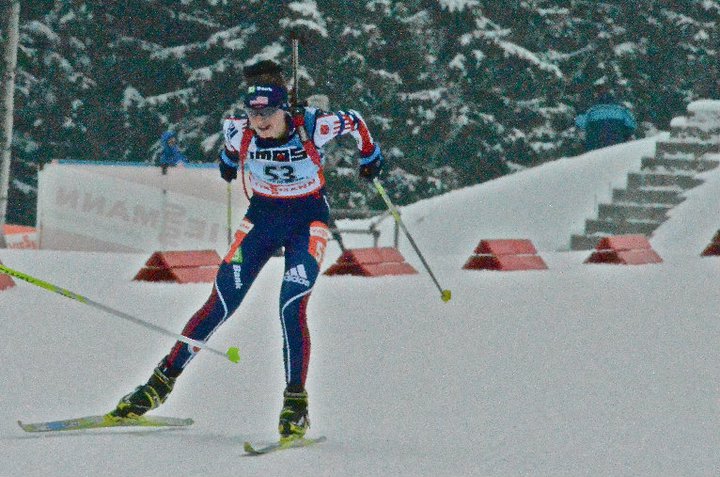
The first time I prioritized something else over my Olympic dream was when I chose to go to college in 2011, and to ski race. Of course, that was an easy one to justify: I’ll keep shooting, college will make me a better skier and, ultimately, a better biathlete, the 2014 Olympics is way too soon to be reasonable and I can aim for 2018 after I graduate… But the thing that motivated this decision most was that I didn’t want to spend the next three years focused solely on getting to the Olympics. Ski racing for a college team sounded like more fun.
I was too naive at the time to understand that having fun should have been my #1 motivation. Throughout my whole childhood my parents had preached “Do it because you love it.” I didn’t really know what that meant. I felt secretly guilty for choosing the “fun option.”
More decisions to pursue the “fun option” followed. After the end of my first collegiate season I made the choice to go on a rock climbing trip in southern Nevada, rather than stay in New England and race the late-season marathons with my teammates. Those marathons are just for fun, I told myself. I don’t have to race them.
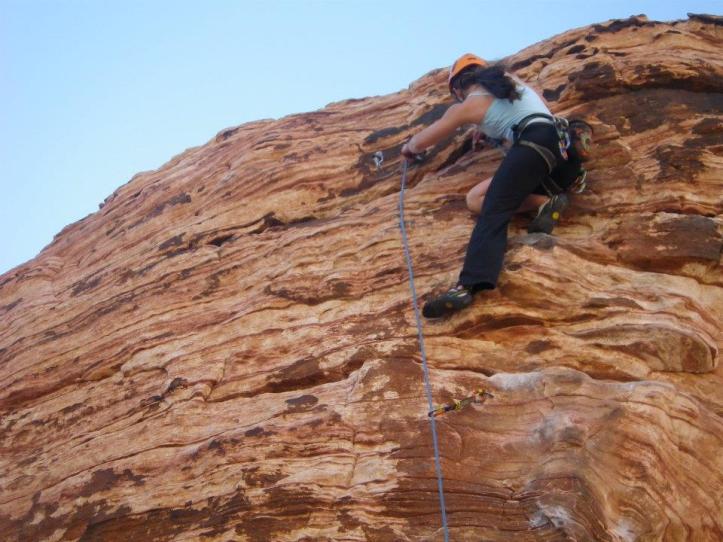
That should have been the warning sign right there: That I regarded any ski race that was “for fun” as unimportant.
The trouble with loving the outdoors and loving being active is that there are so many fun things to do! As I got older and saw more of the world, the list of things I loved to do grew. Simultaneously I was continuing to pursue higher levels of ski racing, and my freedom to enjoy other activities became limited. Long mountain runs were out if they weren’t in the training plan. Making snow forts was a great way to get cold and tired. Rock climbing was a stupid waste of energy that cut into recovery time. By my senior year of college, I found myself purposefully sabotaging workouts by going too long and too hard, just to prove that I could. Just to assert my independence from the sport to which I had once declared such loyalty.
In hindsight, what came next was no surprise. I got terribly sick in December of my senior year of college. I raced the first race of the season… and then the last. Every other race for three months was wiped out by exhaustion, illness, and a complete mental implosion. Yet throughout all this, I stuck to my stubborn insistence that I was going to return to biathlon after graduation. Join a team. Go to the 2018 Olympics.
I met with potential future coaches with a knot in my stomach. I talked with other athletes on my path, pretending I didn’t think their lives sounded totally miserable. With my friends I talked about 2019 with reverence: the year I would be free!
But with almost nothing to show for my senior year race season in 2015, the teams I had been eyeing for so long weren’t very interested in me. The path was not going to be easy. Coaches wanted to talk about my options, wanted to figure out a way to make things work, even if they couldn’t offer me a place right then. This was a blessing in thinly veiled disguise. I didn’t want to make it work.
I said no thanks, turned away, and took a seasonal job in Alta, Utah for the winter after graduation. I packed my bag with a pair of classic skis, a pair of skate skis, and a pair of alpine skis. I flew to Utah.
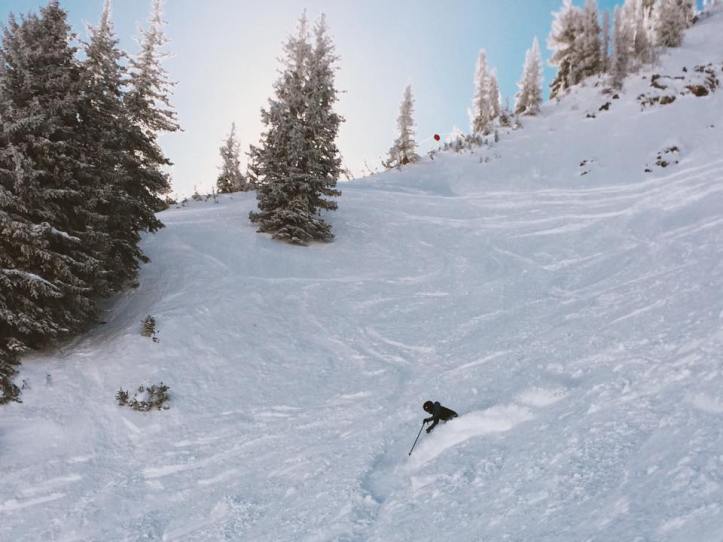
It was there, trapped at the top of Little Cottonwood Canyon for 4.5 months without a car and without Nordic ski trails that it became clear to me, I have no idea who I am if not a Nordie.
Despite my longing for the freedom to explore other parts of myself, I didn’t have the first clue how to start. I barely even knew what those parts were. I’d had vague images of being an alpine ski bum, which was what landed me in Alta in the first place. I had dreams of being a dirtbag, living on the road, living in the mountains. I thought maybe I’d like to get more serious about rock climbing. Or maybe take up ultra running. I mused idly about started my own business.
But after weeks of skiing some of the best powder in the country, I was thoroughly miserable. It just hadn’t occurred to me that I wouldn’t immediately make friends with a bunch of other Nordies who would take me skiing with them. I’d lived in the Nordic bubble for so long, I didn’t really know what the outside world was like. The nearest Nordic trails were at Solitude Mountain Resort, at the top of next-door Big Cottonwood Canyon. A couple miles and a mountain away as the crow flies, and 25 miles by road. I had no car. I started hitchhiking.
So there I was, a Nordie with so much “potential” trying to escape the crushing pressures of Olympic aspirations by disguising myself (unsuccessfully) as an alpine ski bum, hitchhiking two canyons to be able to Nordic ski in a place where nobody cared at all about those little skinny skis on my feet. My winter in Alta was my rock bottom: The loneliest, most lost and most confused that I hope I will ever feel in my life.
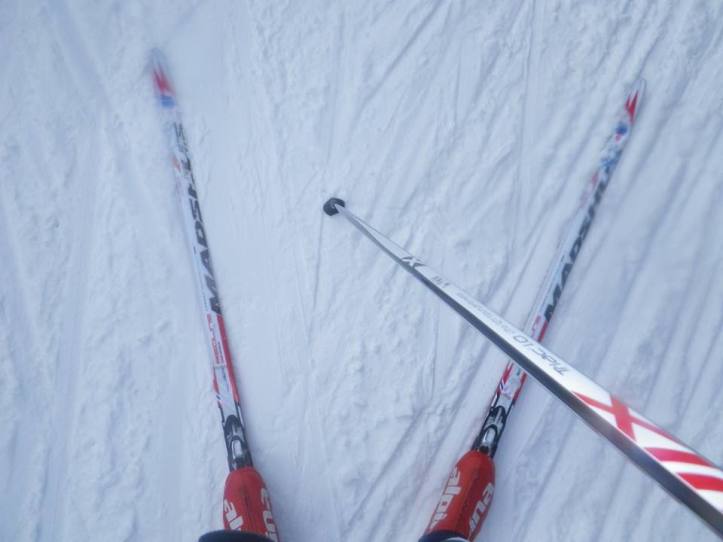
I have learned a few things since then about the Athletic Identity Crisis:
#1) It’s so common.
Athletes that commit as much time and energy to their sport as I have done with skiing are prone to questioning why they do what they do. If you are facing an Athletic Identity Crisis, you are not alone! Your doubts and fears are normal.
#2) Goodbyes can be temporary… but it’s okay if they’re not.
If you decide to take some time away from your sport as I did, it might be easier to approach that time with the mentality that it’s not a permanent break. That being said, if you decide you want it to become a permanent break, don’t let your fears limit you. At some point, you will be much happier on one side of the fence or the other, so take the plunge, commit to being done. Once you’ve done that…
#3) We do have an identity outside of “Athlete”
The question of who would I be if not a Nordie haunted me for a long time. Facing the Athletic Identity Crisis may be the only way to discover who and what else you would like to be apart from your athletic identity. Face the void. You will find yourself.
#4) It is possible to rediscover the love of your sport!
After facing my Athletic Identity Crisis, I discovered that I really wanted to return to my identity as a competitive Nordie. If you make a change or take a break and then return to high level competition like I did, remember that it doesn’t have to be the same as it once was. Though I love Nordic skiing now more than ever, I’ve also made substantial changes to its role in my lifestyle. And remember, loving your sport can mean a variety of things. If you are ready to love your sport recreationally, go for it! I know I’ll get there too some day.
#5) The earlier the better
Voice your doubts when they surface. Don’t let the issue grow into an all-consuming anxiety like mine did. If something is nagging in the back of your mind, talk to a teammate. Talk to a coach. Talk to me. Just talk to somebody who has been there. You’ll be relieved.
***
During the summer of 2016, one year after graduation, I returned to a full time training plan. Not ready to fully commit to a ski season, I trained half as a runner and half as a skier. I ran my first half marathon. I had an unsuccessful go at a 5k PR. I took a 3 week vacation to Europe. Then I raced on my skinny skis, a one-woman team, often waxing for myself, and had the most fun season of my life. I came out of that season ready to focus entirely on the 2017/2018 season.
In the spring of 2017, I sold my biathlon rifle. In doing so, I acknowledged that I will never be an Olympian. But truthfully, I let go of that image of myself a long time ago. What motivates me now is no longer a desire to prove that I can make it to the top. I nearly lost my love for ski racing in pursuit of that goal, and I am so lucky to have reconnected with it. I will never again prioritize another goal above “fun.”
As you may know, I spent this summer and fall training in Bend, OR. I am preparing for another independent season, though with lots of outside help this year. I will be racing the SuperTour circuit, though I won’t make it to every race. As a one-woman show on a shoestring budget, travel logistics might be a bit crazy at times. As will wax support at some of my races.
I may not be doing this the easy way. Or the normal way. But I’m doing it in my version of the Fun Way. The way that brings me to life. Along the way, I hope to spread the message that the Athletic Identity Crisis is a normal part of life as an athlete. Whether it’s a full-scale meltdown like I had, or a just few doubts, these feelings are part of the process. These thoughts don’t make any of us a “bad” athlete. It’s not a weakness.
It’s our chance to discover what loving a sport truly is.
Carly

Find me on Instagram and Facebook @ CarlyOutside_TheBox
p.s. I hope to spread this message widely, and help other athletes discover what it means to truly love their sport. I will be all over the country this winter, and if I’m coming to a place near you and you’d like to meet up, or introduce me to some athletes in your area, I’d love to connect. My race schedule can be found here. When I’m not racing, I will be spending time in Oregon, Wyoming, Utah, Alaska, New York, and Vermont. I am particularly interested in hosting ski lessons and clinics, and speaking at events. If my message resonates with you, please consider sharing this post.
p.p.s. Want to see a video of the exercise that made me a totally different skier last year? Join the email list and I’ll send you the video! (You can do it in your living room.)
p.p.p.s. Got something on your mind? Want to talk about your own Athletic Identity Crisis? Contact me. I’d love to hear from you.
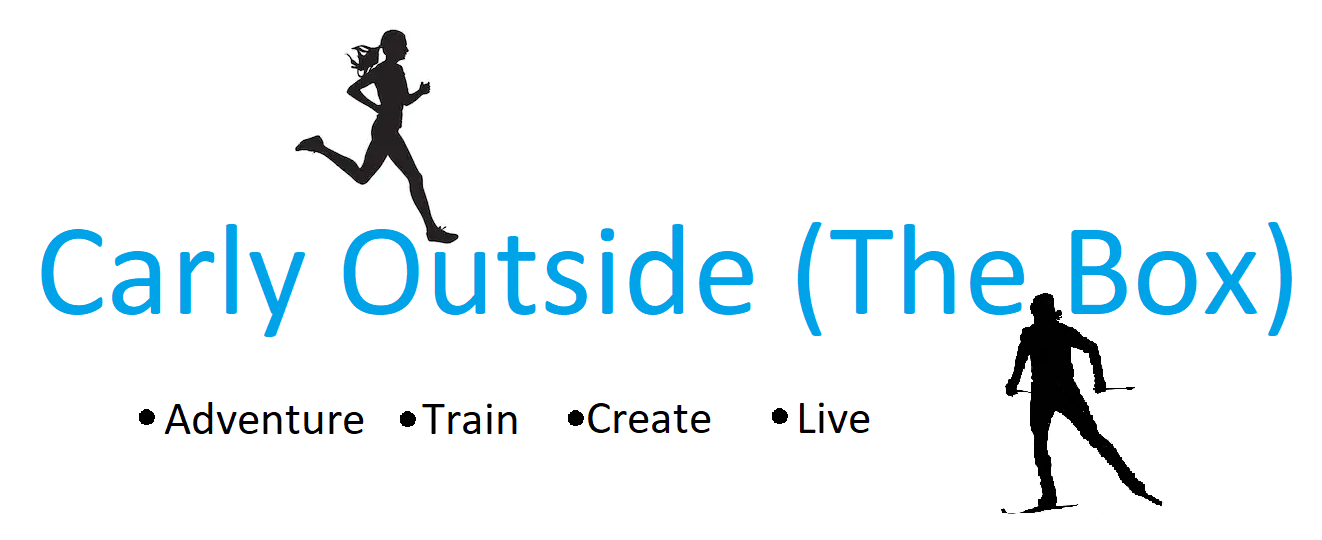
Carly- I loved reading this. I loved the honesty. I’ve never been particularly good at any sport, so can’t relate exactly, but I relate in getting so into something that I start questioning why I’m doing it. Maybe write a post about how you define fun. How do you define it for others? How do you help others find it? Keep being awesome and fun.
LikeLike
[…] a mindset I’ve been cultivating ever since I took a year off from ski racing to deal with my Athletic Identity Crisis. “We’re all here to have fun, right?” I said to […]
LikeLike
[…] had raced at Nationals was 2014. Nationals 2015 was taken out by illness, in 2016 I was working at Alta Ski Area and having an Athletic Identity Crisis, and last year I was doing my Solo-Season, racing Eastern Cups in New England. Though I knew I was […]
LikeLike
[…] coming through my Athletic Identity Crisis, I was extremely fortunate to find that I still loved ski racing. After racing a regional circuit […]
LikeLike
[…] spent another couple days in Salt Lake visiting a friend from my Alta winter, where I was stoked to hit the Bonneville Shoreline Trail for an early morning run. There’s […]
LikeLike
[…] roommates the winter of 2016 when I worked at Alta Ski Resort. Those of you who have read about my Athletic Identity Crisis know that that winter was one of the toughest of my life. Terribly lonely, recently graduated, […]
LikeLike
[…] You might have noticed the lack of the question of whether or not I will continue racing after I recover from this. Really, that question was addressed and answered three years ago, as I worked through my Athletic Identity Crisis. […]
LikeLike
[…] coming through my Athletic Identity Crisis, I was extremely fortunate to find that I still loved ski racing. After racing a regional circuit […]
LikeLike
[…] pursuits of training for a race and then racing that race. (The fear of this aimlessness, or the ensuing identity crisis, sometimes keeps athletes in their sport for no clear reason besides.) Far from lamenting this, I […]
LikeLike
[…] If your answer is complicated, you might want to check out last week’s blog post, or an old favorite, The Athletic Identity Crisis. […]
LikeLike
[…] assured me was merely “frowned upon.” Struggling with my crushing loneliness, my athletic identity crisis, and an eating disorder that left me constantly craving more exercise, I craved the feeling of […]
LikeLike
[…] The Athletic Identity Crisis You’ve Got “The Look” Lost and Found […]
LikeLike
[…] Which wasn’t entirely true. I did know some things that I wanted. I knew I wanted to travel, for example. I also knew some things I didn’t want: I didn’t want to keep working seasonal jobs. I was averse to the idea of a permanent living location, but I didn’t have a clue how things like taxes or insurance or car registration work when you live in 4 different states in one year. The biggest thing I did NOT know was whether I wanted to keep ski racing. That was a very specific type of crisis, the Athletic Identity Crisis. […]
LikeLike